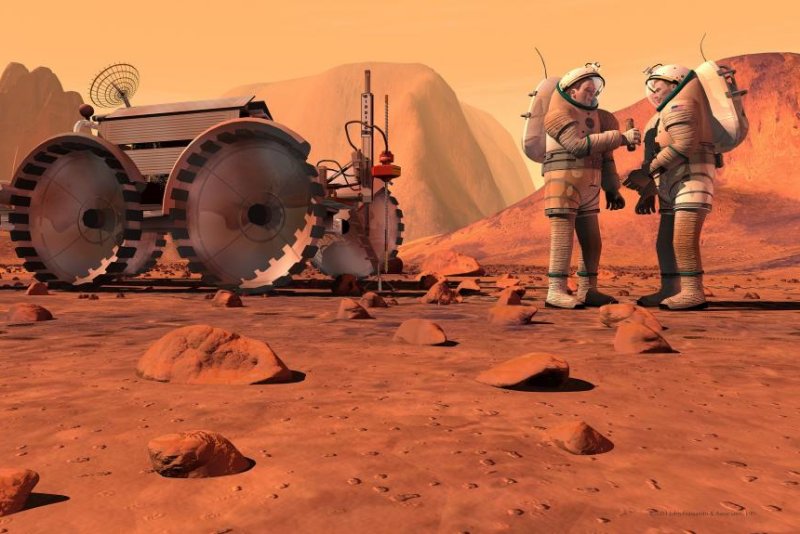A compound from the skin of red grapes, found in red wine, could help protect astronauts on Mars from muscle atrophy. Photo by NASA
July 18 (UPI) -- Resveratrol, a phenol found in red wine, could be used to protect the muscles of astronauts during extended stays in space, like on a mission to Mars.
During recent experiments, scientists found the supplement protected lab rats from muscle atrophy while living under conditions approximating Mars' microgravity environment.
Research suggests long periods of time spent in space have a negative of effect on the body's muscles and bones. When gravity is weak, the body's bones and muscles don't have to do much work. And when bones and muscles don't work, they atrophy, or weaken. The major weight-bearing bones and muscles, like the soleus muscle in the calf, are the first to go.
"After just 3 weeks in space, the human soleus muscle shrinks by a third," Dr. Marie Mortreux, researcher Harvard Medical School, said in a news release. "This is accompanied by a loss of slow-twitch muscle fibers, which are needed for endurance."
On the International Space Station, astronauts have exercise equipment to help them maintain the strength and health of their muscles. But on a long-distance space mission to Mars, astronauts won't have the same resources.
Scientists have been looking for supplements that could help astronauts prevent muscle and bone atrophy. The potential health benefits of resveratrol, a compound found in the skins of red grapes and blueberries, have been previously investigated. Some studies suggest the compounds provides anti-inflammatory, anti-oxidative, and anti-diabetic effects.
The latest study, published Thursday in the journal Frontiers in Physiology, looked at the compound's effects on musculoskeletal health.
"Resveratrol has been shown to preserve bone and muscle mass in rats during complete unloading, analogous to microgravity during spaceflight," Mortreux said. "So, we hypothesized that a moderate daily dose would help mitigate muscle deconditioning in a Mars gravity analogue, too."
To replicate microgravity conditions -- Mars features 40 percent of Earth's gravity -- scientists fitted lab rats with a harness and suspended them from the ceiling of their cages, allowing their feet to just barely touch the ground. Half the rats were fed water supplemented with resveratrol. All of the rats ate the same diet.
During the 14-day study, scientists measured the rats' calf circumference and strength of their rear paw grip.
The muscles of rats who only drank water got smaller and weaker, but for the others, resveratrol almost totally prevented musculoskeletal wasting. Researchers say the compound's anti-inflammatory and anti-oxidative could help conserve muscle and bone health. The compound may also guard against decreased insulin insensitivity.
"A likely factor here is insulin sensitivity," Mortreux said. "Resveratrol treatment promotes muscle growth in diabetic or unloaded animals, by increasing insulin sensitivity and glucose uptake in the muscle fibers. This is relevant for astronauts, who are known to develop reduced insulin sensitivity during spaceflight."
More experiments are needed to determined the ideal dosing levels for males and females, and to test for potential complications with other drugs and supplements.















